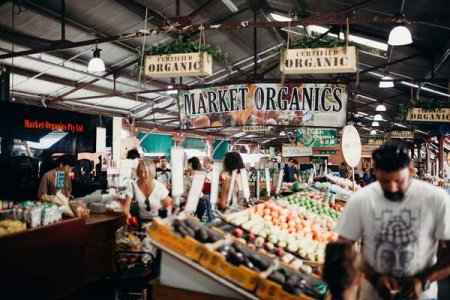Mum shares money-saving secret to bagging grocery shopping bargains
- Replies 27
As the cost of living continues to rise, many Australians are feeling the pinch, particularly when it comes to the weekly grocery bill.
In a quest to navigate the grocery aisles more economically, one savvy Australian mum has unveiled her ingenious strategy to slash weekly shopping bills without sacrificing quality or variety.
Cara Bell has turned her back on the big supermarket chains like Woolworths, Coles, and ALDI.
Instead, she's embracing local markets, butchers, and food co-ops to feed her family on a budget.

At the heart of Cara's strategy is a commitment to sourcing 'mostly organic' produce directly from farmers' markets.
With just $30, she's able to secure a bounty of fresh fruits and vegetables, along with a carton of eggs. The local butcher is her next stop, where $57 buys her two trays of beef mince, marinated chicken wings, and five grass-fed rump steaks.
It's a whole week's worth of meals for $87—a fraction of what many households spend according to Finder.
‘I definitely don’t buy fruit and vegetables, or bread from the supermarket anymore. I make my own bread now, and my own muffins,’ she said.
Cara doesn't just stop at smart shopping. She's also taken to growing her own produce and keeping chickens.
By joining a food co-op buying group, Cara and other families also pool their resources to purchase bulk items that undercut even the discount supermarkets.
‘We buy bulk organic foods and split [them] between many families,’ Cara said.
‘So, things like nuts, seeds, organic flours, and dates are all cheaper than the supermarket still—plus they are organic and Australian grown.’
By steering clear of supermarkets, Cara has managed to sidestep food scarcities by crafting many items herself.
‘There has been no (pickled) beetroot at the shops, so I've been making my own and my own granola,’ she explained.
‘I also... [have] a huge veggie patch plus fruit trees. I hope this inspires others to try and do the same.’
The benefits of Cara's approach extend beyond her wallet. She's noticed that her food lasts longer, tastes better, and results in limited waste.
‘The quality is much better, nothing goes to waste, as I have chickens and a compost heap,’ she said.
‘Then it goes onto my garden with chook manure and it helps to fertilise my six large veggie patches.’
Bell mentioned that she had ‘always been careful’ in her shopping habits beforehand, but escalated her homemade efforts when the pandemic struck.
‘Things like sourdough bread were getting too expensive to buy, [and] the produce available at the shops was terrible and expensive, or unavailable,’ she recalled.
Cara's story is particularly timely as the Australian Competition and Consumer Commission investigates supermarket pricing practices amidst the cost-of-living crisis.
Consumer expert Gary Mortimer has observed that more and more consumers are shopping around to secure the best deals.
‘Most shoppers today will shop across multiple brands of supermarkets in order to save,’ he said.
‘It's not uncommon to shop at ALDI for the basics like lunchbox snacks, and then pop into a greengrocer for fruit and vegetables, and even Woolworths or Coles to buy other products on “special”.’
Other Australians are following suit, sharing their own tips to slash their grocery bills.
‘I'm going back to the old ways of making and baking food. More healthy too,’ one said.
Some are even opting for 'imperfect' produce, which offers mystery boxes of fruits and vegetables that don't meet the aesthetic standards of the big supermarkets, but are perfectly good to eat.
‘I’ve been getting fruit and vegetables from “Farmers Pick” for six weeks now. Around $65 per fortnight for four adults,’ they shared.
‘The produce is the stuff the big 2 (Coles and Woolworths) reject based on size/shape/maturity. [There's] nothing wrong with it. It’s a mystery box, but makes me think outside of my usual boring meal plans.’
We also have a bunch of tips and tricks to help you save money on grocery shopping.
You can try what Cara did—shopping in other stores aside from supermarkets—and you can also check out this tip if you cannot avoid buying your groceries in supermarkets.
 Would you be willing to try Cara’s method of saving on groceries? Do you have other tips on how to minimise your cost when shopping? Share your thoughts and tricks in the comments below!
Would you be willing to try Cara’s method of saving on groceries? Do you have other tips on how to minimise your cost when shopping? Share your thoughts and tricks in the comments below!
In a quest to navigate the grocery aisles more economically, one savvy Australian mum has unveiled her ingenious strategy to slash weekly shopping bills without sacrificing quality or variety.
Cara Bell has turned her back on the big supermarket chains like Woolworths, Coles, and ALDI.
Instead, she's embracing local markets, butchers, and food co-ops to feed her family on a budget.

Cara Bell suggested avoiding shopping at major supermarkets to save on grocery costs. Credits: Shutterstock
At the heart of Cara's strategy is a commitment to sourcing 'mostly organic' produce directly from farmers' markets.
With just $30, she's able to secure a bounty of fresh fruits and vegetables, along with a carton of eggs. The local butcher is her next stop, where $57 buys her two trays of beef mince, marinated chicken wings, and five grass-fed rump steaks.
It's a whole week's worth of meals for $87—a fraction of what many households spend according to Finder.
‘I definitely don’t buy fruit and vegetables, or bread from the supermarket anymore. I make my own bread now, and my own muffins,’ she said.
Cara doesn't just stop at smart shopping. She's also taken to growing her own produce and keeping chickens.
By joining a food co-op buying group, Cara and other families also pool their resources to purchase bulk items that undercut even the discount supermarkets.
‘We buy bulk organic foods and split [them] between many families,’ Cara said.
‘So, things like nuts, seeds, organic flours, and dates are all cheaper than the supermarket still—plus they are organic and Australian grown.’
By steering clear of supermarkets, Cara has managed to sidestep food scarcities by crafting many items herself.
‘There has been no (pickled) beetroot at the shops, so I've been making my own and my own granola,’ she explained.
‘I also... [have] a huge veggie patch plus fruit trees. I hope this inspires others to try and do the same.’
The benefits of Cara's approach extend beyond her wallet. She's noticed that her food lasts longer, tastes better, and results in limited waste.
‘The quality is much better, nothing goes to waste, as I have chickens and a compost heap,’ she said.
‘Then it goes onto my garden with chook manure and it helps to fertilise my six large veggie patches.’
Bell mentioned that she had ‘always been careful’ in her shopping habits beforehand, but escalated her homemade efforts when the pandemic struck.
‘Things like sourdough bread were getting too expensive to buy, [and] the produce available at the shops was terrible and expensive, or unavailable,’ she recalled.
Cara's story is particularly timely as the Australian Competition and Consumer Commission investigates supermarket pricing practices amidst the cost-of-living crisis.
Consumer expert Gary Mortimer has observed that more and more consumers are shopping around to secure the best deals.
‘Most shoppers today will shop across multiple brands of supermarkets in order to save,’ he said.
‘It's not uncommon to shop at ALDI for the basics like lunchbox snacks, and then pop into a greengrocer for fruit and vegetables, and even Woolworths or Coles to buy other products on “special”.’
Other Australians are following suit, sharing their own tips to slash their grocery bills.
‘I'm going back to the old ways of making and baking food. More healthy too,’ one said.
Some are even opting for 'imperfect' produce, which offers mystery boxes of fruits and vegetables that don't meet the aesthetic standards of the big supermarkets, but are perfectly good to eat.
‘I’ve been getting fruit and vegetables from “Farmers Pick” for six weeks now. Around $65 per fortnight for four adults,’ they shared.
‘The produce is the stuff the big 2 (Coles and Woolworths) reject based on size/shape/maturity. [There's] nothing wrong with it. It’s a mystery box, but makes me think outside of my usual boring meal plans.’
We also have a bunch of tips and tricks to help you save money on grocery shopping.
You can try what Cara did—shopping in other stores aside from supermarkets—and you can also check out this tip if you cannot avoid buying your groceries in supermarkets.
Key Takeaways
- An Australian mum, Cara Bell, managed to save on grocery costs by avoiding major supermarkets Coles, Woolworths, and ALDI, instead sourcing food from local butchers, farmers markets, and a food co-op buying group.
- Cara Bell spends $87 a week on groceries for her family, significantly less than the average household's grocery bill, by making her own bread, growing produce, and keeping chickens.
- By moving away from supermarkets, Bell avoided food shortages and enjoyed better quality food that lasts longer, tastes better, and produces limited waste, adding to her savings.
- The trend of seeking alternatives to traditional supermarkets is growing among Australian consumers who are looking for better deals and quality, as highlighted by an ongoing investigation into supermarket pricing practices by the Australian Competition and Consumer Commission.







